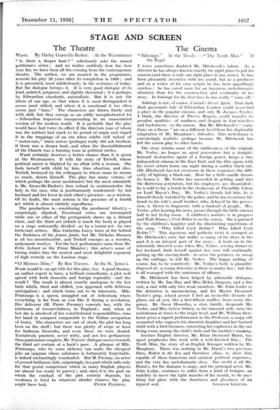STAGE AND SCREEN
"Is there a deeper hurt ? " solicitously asks the ruined politician's sister ; and we realise suddenly how far, how very far, we have been all the evening from the contemporary theatre. The author, we are assured in the programme, rewrote his play 20 years after its completion in 1900; and it is presented, most infelicitously, in the costumes of today. But the dialogue betrays it. It is very good dialogue of its kind, pointed, pregnant, and slightly rhetorical ; it is perhaps, by Edwardian standards, naturalistic. But it is not the idiom of our age, so that where it is most distinguished it seems most stilted, and where it is emotional it too often seems just "ham." The characters are drawn firmly and with skill, but they emerge as an oddly unsophisticated lot —Edwardian impostors masquerading in an emasculated version of the modern world. It is probable that the play would have had twice its effect if the directors (one of whom was the author) had stuck to its period of origin and staged it in the trappings of an era when adults still talked of "motor-cars," when sisters (perhaps) really did ask brothers if there was a deeper hurt, and when the disestablislunent of the Church was a burning issue in political circles.
Waste certainly deserves a better chance than it is given at the Westminster. It tells the story of Trebell, whose political career is blighted by an affair with a woman. She finds herself with child by him, tries abortion, and dies. Trebell, betrayed by the colleagues to whose cause he means so much, shoots himself. The play has many virtues, of which perhaps the most unobtrusive but the most admirable is Mr. • Granville-Barker's firm refusal to sentimentalise the lady in the case, who is posthumously condenined—by her husband and her lover in each other's presence—as a wanton. Of its faults, the most serious is the presence of a fourth act which is almost entirely superfluous.
The production is—considering the producers' identity— surprisingly slipshod. Emotional crises are interrupted while one or other of the protagonists draws up a distant chair, and the third act (which is much the best) is played on a stage awkwardly divided—as by a tennis net—by two irrelevant settees. Miss Catherine Lacey hints at fire behind the flashiness of the femme fatak, but Mr. Nicholas Hannen is all too incombustible, and Trebell emerges as a wooden, undynamic martyr. Far the best performance came from Mr. Felix Aylmer as the Prime Minister ; this actor's sense of timing makes him the neatest and most delightful exponent of high comedy on the London stage.
















































 Previous page
Previous page